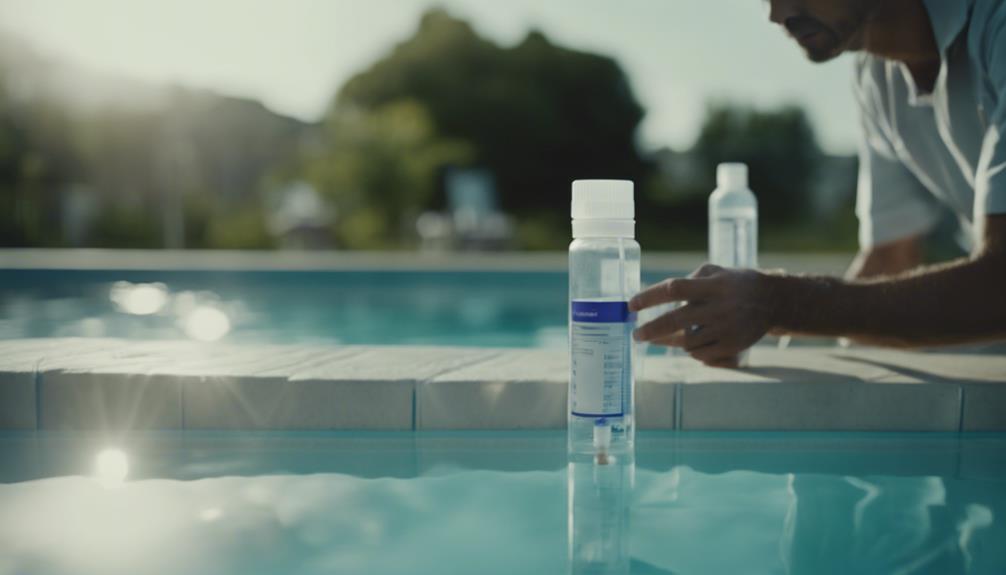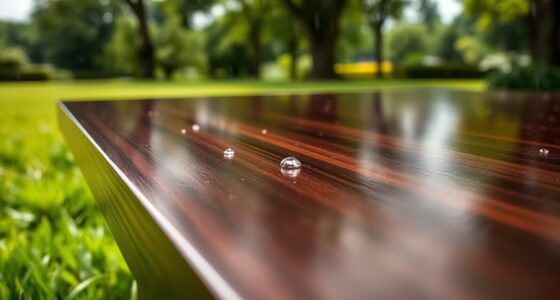Maintaining pH balance between 7.2-7.6 prevents corrosion and skin irritation. Use chemicals like muriatic acid and soda ash for adjustment, and handle them carefully. Pool testing kits are essential to monitor pH, chlorine levels, and more accurately. Test strips offer a quick way to assess chemicals but may be less precise. Keep pool chemicals within reach near the pool for prompt adjustments while storing them safely away from kids and pets. These tips are fundamental to ensuring a safe and enjoyable swim.
Key Takeaways
- Regularly test pool water pH levels.
- Use appropriate chemicals like muriatic acid and soda ash.
- Follow professional guidance for chemical handling.
- Keep pool chemicals stored safely and accessible.
- Maintain proper balance for safe swimming conditions.
Understanding Ph Balance
Maintaining the proper pH balance in your pool is fundamental for preventing surface corrosion and skin irritation. The pH level measures the acidity of the water on a scale of 0-14, with the ideal range for pool water being 7.2-7.6.
Imbalances in pH can lead to issues such as skin redness, itching, cloudiness, and dry skin. Acidic water can cause skin irritation, while basic water can lead to dryness.
To guarantee a safe and enjoyable swimming experience, it is important to monitor and adjust the pH levels regularly.
Understanding the impact of pH balance on your pool water quality is essential to maintaining a healthy and inviting swimming environment.
Chemicals for Ph Balance
To achieve proper pH balance in your pool, it is important to understand the chemicals involved in the process.
Dry acid or muriatic acid are commonly used to lower pH levels in acidic pool water, while soda ash is effective in maintaining pH. These chemicals should be handled and stored carefully to prevent accidents.
It is advisable to seek guidance from a professional for safe dispensing of these chemicals. Regular monitoring of pool pH levels is vital to maintain a balanced environment for swimming.
Invest in Pool Testing Kit

Why is investing in a pool testing kit necessary for effective pool maintenance?
A pool testing kit is an essential tool for pool owners to accurately monitor and maintain water quality. These kits typically measure important parameters such as pH, chlorine levels, alkalinity, and calcium hardness.
By regularly testing these factors, pool owners can make sure that the water is balanced, safe, and comfortable for swimmers. A reliable testing kit not only aids in compliance with regulations but also provides accurate readings for informed chemical adjustments.
Use Swimming Pool Test Strips
For a convenient and quick assessment of your pool's chemical levels, utilizing swimming pool test strips is an efficient solution. These strips provide a simple method to check the levels of pH, chlorine, and other chemical parameters in your pool water. By dipping a strip into the water and comparing the color it changes to a provided chart, you can easily determine if any adjustments are needed. While test strips offer convenience, it's important to note that they are generally less accurate than drop tests. Always consult the manual to interpret the results correctly and maintain the proper chemical balance in your pool.
| Pros | Cons |
|---|---|
| Quick and convenient | Less accurate than drop tests |
| Easy to use | May require frequent testing |
| Affordable | Limited in detecting nuances |
Keep Pool Chemicals Accessible

Pool owners can maintain convenient access to important pool chemicals by storing them in a designated, easily reachable area near the pool. It is vital to have chlorine tablets, pH adjusters, and test kits readily available for weekly maintenance tasks. By keeping these chemicals accessible, pool owners can promptly address any imbalances in the water chemistry, ensuring a safe and enjoyable swimming experience.
Additionally, it is essential to store these chemicals out of reach of children and pets to prevent accidents. Regularly monitoring and restocking the chemical supplies will help maintain proper pool sanitation and water quality.
Important Pool Chemicals to Use
Pool owners should prioritize the use of vital chemicals to maintain proper sanitation and water quality in their swimming pools. Oxidizers like Calcium Hypochlorite are important for sanitizing, while Chlorine Free Shock provides quick sanitization.
Water balancers such as Alkalinity Increaser and Calcium Hardness Increaser help maintain balanced water chemistry. Water clarity enhancers like Algaecides and Enzymes aid in keeping the pool water crystal clear. Additionally, using Phosphate Removers can help prevent algae growth.
It is important to have these chemicals on hand to guarantee the pool remains safe and enjoyable for swimmers. Regularly testing and maintaining proper chemical levels will result in a clean and inviting swimming environment.
Frequently Asked Questions
Can I Use Household Vinegar to Balance Ph Levels in My Pool?
Household vinegar, though acidic, is not recommended to balance pH levels in pools. Its composition and strength are not suitable for pool water maintenance. Instead, opt for pool-specific chemicals like dry acid or muriatic acid for effective pH adjustment.
How Often Should I Shock My Pool With Chlorine-Free Shock?
Shock your pool with chlorine-free shock every 1-2 weeks to maintain water clarity and cleanliness. Regular shock treatments help eliminate contaminants and prevent algae growth, ensuring a safe and inviting swimming environment for your pool users.
Is It Safe to Mix Different Pool Chemicals Together for Convenience?
Mixing different pool chemicals together for convenience is unsafe and can lead to hazardous reactions. Always follow manufacturer guidelines and do not combine products unless specified. Consult a professional for safe handling and dispensing practices.
What Is the Shelf Life of Pool Test Strips Once Opened?
Once opened, pool test strips typically have a shelf life of 6-12 months, depending on the manufacturer. Proper storage is essential to maintain accuracy. Seal the container tightly, keep it in a cool, dry place away from sunlight, and avoid exposure to moisture.
Can I Use Baking Soda as a Substitute for Alkalinity Increaser?
While baking soda can temporarily raise alkalinity, it lacks buffering capacity compared to an alkalinity increaser. Prolonged use may lead to pH spikes. Consult a professional to guarantee proper chemical balance and avoid potential pool damage.
Conclusion
To sum up, maintaining the chemical balance in your pool is essential for ensuring a pleasant swimming experience. By following the tips outlined in this article, you can keep your pool water clean and safe for all swimmers.
Remember to regularly test and adjust the pH levels, keep necessary chemicals on hand, and invest in a pool testing kit for accurate readings.
By staying proactive in your chemical maintenance routine, you can enjoy a worry-free swim every time.










